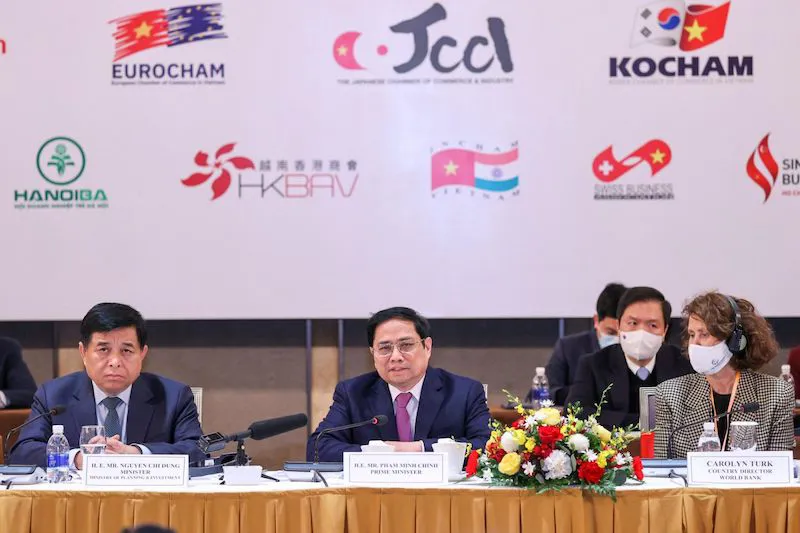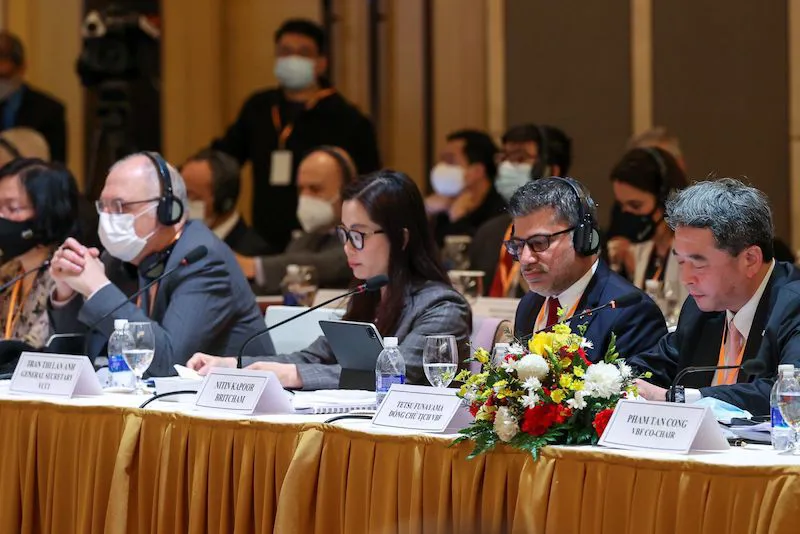Vietnam removes barriers towards economic recovery: VBF 2021
The Vietnamese Government creates an equal environment among all economic sectors, including private and foreign investment, for the country's economic development.
The Vietnamese Government will strengthen dialogues with domestic and foreign business associations to remove shortcomings, institutional barriers and legal regulations hindering production and business activities as well as promote the development and recovery of the production chain.
| Prime Minister Pham Minh Chinh discusses with international and domestic delegates at the VBF 2021. Photo: Nhat Bac/VPG |
Prime Minister Pham Minh Chinh made the statement at the Annual Vietnam Business Forum (VBF) High-level Session 2021 on February 21 in Hanoi.
The Prime Minister requested relevant ministries and branches to consider absorbing and integrating the delegates' reasonable proposals and recommendations into their programs and action plans during the implementation of Resolution No. 11 on socio-economic development and recovery program and Resolution No. 43 of the National Assembly on fiscal and monetary policies to support the program.
Chinh wanted the local and foreign business community, the Government, and the people of Vietnam to effectively fulfill the socio-economic development goals in 2022.
He underlined that the Government has focused on measures to restore the supply chain, ensuring the circulation of goods and stabilizing the fuel supply, simplifying administrative procedures, removing obstacles in tax, credit, human resource, infrastructure, logistics mechanisms, and policies.
Particularly, he emphasized the priority of developing the markets for production factors such as capital, land, resource, science and technology, and intelligence in a market-oriented, competitive, efficient and sustainable manner.
"The Government always creates an equal environment among all economic sectors, encouraging private and foreign investment, investment in high technology, supporting industries, smart agriculture, environmental protection, renewable energy, infrastructure construction and projects serving social security," Chinh said.
Measures for sustainable economic recovery
| Delegates attend the forum in Hanoi. Photo: VCCI |
At the VBF 2021 High-level Session, representatives from organizations, business associations, and the VBF working group discussed many proposals to recover and develop the economy firmly against the negative impacts of the Covid-19 pandemic.
At the forum, Pham Tan Cong, Chairman of the Vietnam Chamber of Commerce and Industry (VCCI) said 2022 is expected to be another challenging year for the Vietnamese economy. In that context, the Government has quickly taken measures to support the business community, recover and develop the economy. Protocols on safe, flexible adaptation and effective control of the pandemic have been implemented consistently from central to local levels, creating the best conditions for the circulation of goods and labor after the pandemic.
Cong gave 10 recommendations including facilitating the information access to policies and regulations to support businesses, effectively assisting enterprises in accessing financial sources and simplifying immigration and travel procedures for workers and experts, accelerating the IT application in administrative procedures, among others.
Alain Cany, Chairman of the European Chamber of Commerce in Vietnam (EuroCham) strongly applauded the Vietnamese Government’s efforts in 2021 in issuing and revising a number of regulations to comply with the EU-Vietnam Free Trade Agreement (EVFTA) and to simplify administrative measures for Vietnam to become an attractive investment destination.
“The business community should be more associated or consulted in assisting the Committee on Trade in Goods in carrying out reviewing and monitoring the implementation and operation of EVFTA according to Article 2.23 of this Treaty,” he said.
He said the input of businesses on both sides is essential for regulators to identify the obstacles impeding the full implementation of the EVFTA for better trade and investment integration. "EuroCham and its Sector Committees are willing to engage both with the EU Delegation as well as with Vietnamese regulatory authorities in providing specific input, to follow and to comment and improve the implementation of the EVFTA," he said.
He said EuroCham recommended strengthening cooperation between the competent authorities in Europe and Vietnam to remove trade bottlenecks and existing barriers, and at the same time create a favorable environment for the exchange of services and goods between the contracting parties; at the same time, develop a transparent process to be implemented at all levels of management to maximize the mutual benefits of enterprises.
“We do hope that these comments and recommendations will make Vietnam an even more open and more attractive environment for international investment and will accelerate the country’s restoring & developing supply chain in the new normal,” he added.
Speaking at the event, Inoue Soichi, Chairman of the Federation of Japanese Chamber of Commerce and Industry in Vietnam in Vietnam said: “Lots of Japanese companies faced interruption of supply chain because of Covid-19 and the strict Zero-Corona policy. We strongly hope to witness the continued With-Corona policy and high economic growth in 2022 under the leadership of the Vietnamese Prime Minister.”
On the resilience side, Carolyn Turk, World Bank Country Director for Vietnam said that the next year will be quite turbulent. "For the next year or two, we expect with sector growth rates in industrialized countries will slow down. We expect that interest rates will go up, inflation may be a feature of many economies. And this will be a challenging global context for Vietnam to plan an extra recovery," she underlined.
"The Vietnamese Prime Minister mentioned the impacts of the need for resilience to climate change. And this is indeed a huge problem for Vietnam in 2020, we estimated that over 3% of GDP was lost to severe weather events. And by 2050, it might be as much as 15 or 20% of GDP that you're spending on climate change-related disasters that hit Vietnam. And this is an area in which we would be very happy to work with the government of Vietnam to make sure the kind of adaptation measures that are needed are put in place to help you maximize your resilience," she noted.
There is no pathway to high-income status without increasing labor productivity, which comes from increasing labor skills to meet international standards. It's an area in which Vietnam is currently lagging, she said.












